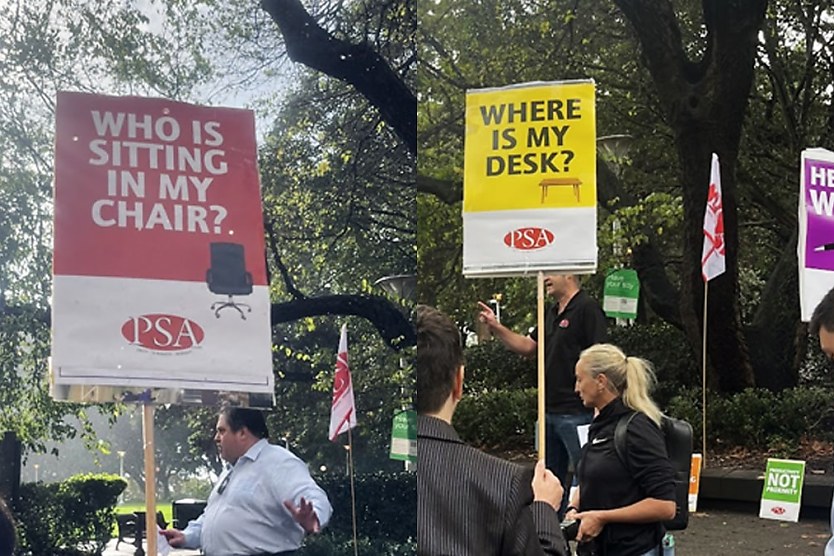‘Where’s my desk?’: Workers brave rain to protest Minns’ workplace presence policy
SHARE THIS ARTICLE

Despite rain in Sydney, public sector workers today (1 May) rallied against the intricacies of NSW Premier Chris Minns’ workplace presence policy – with union leaders calling on the NSW transport department to make the needed amendments.
This morning, Transport for NSW workers stress-tested Chris Minns’ workplace presence policy, with a large cohort of union members attending the Sydney CBD’s Elizabeth Street hub.
The determined action taken by the Public Service Association (PSA) today involved a large cohort of staff congregating outside the Elizabeth Street working hub – voicing their objections to the Premier’s workplace presence policy announced back in August 2024.
Attendees marched across the busy Elizabeth Street, chanting in unison: “Where’s my desk?” airing out their grievances towards the controversial policy that feeds into the ongoing polarisation of workplace flexibility.
The PSA has been in ongoing consultation with Transport for NSW (TfNSW) on how the Premier’s policy will be implemented – with the NSW department currently reviewing feedback from the union members.
Despite the PSA acknowledging that its most recent discussions with the NSW department “were productive in terms of understanding the issues with the policy as it currently stands”, its members still “overwhelmingly endorsed taking action”.
“The default arrangement in the TfNSW policy is that staff are to attend the workplace five days a week, with ad hoc requests to work from home considered,” said PSA acting general secretary Troy Wright.
“One major concern with the policy as it stands is that our members are going back to the office and finding there isn’t a desk for them to sit at.”
“We’ve had members travelling across Sydney in peak hour, adding to traffic congestion, merely to sit in a cafe downstairs on a laptop because there’s no room in the office – that serves no one.”
As previously reported on HR Leader, union members claimed that they’ve been forced to sit “on the floor” when they come into the office as there is “no desk for them” – with others moving to a nearby coffee shop to carry out their job roles.
“Ninety or so [could] turn up to an office for an in-person day, and there [are] only 20 desks,” said one of the members.
In a previous statement given to HR Leader, a TfNSW spokesperson rebutted the claims that workers were forced to sit on the floor due to a lack of desks.
“We did not receive feedback from our people during the workplace presence consultation period that suggested any employee of ours has had to sit on the floor to do their work,” the spokesperson said.
‘Inefficient and unproductive process’
In regards to the action taken today, HR Leader spoke to PSA industrial manager Nathan Bradshaw, who addressed members outside the Elizabeth Street hub – calling on TfNSW to amend its approach to the policy, touching on the detriments it poses to workers.
“The current policy that Transport has come up with is not up to scratch,” Bradshaw said.
“Any policy that reduces flexibility reduces the workforce participation of women. The impact on regional communities is enormous. The requirement to attend a team hub will significantly affect career opportunities for regional members.”
“The impact on cost of living, efficiency, work/life balance and wellbeing is another area that cannot be overlooked. The increase in commuting to an office, in many cases, to simply tick a box … It just doesn’t make sense. That is a clear, inefficient and unproductive process.”
A PSA delegate who spoke at the action touched on an often-contrived reason for why an RTO mandate is needed, which is to foster “collaboration” between workers.
When Amazon initially introduced its own return-to-office mandate, chief executive Andy Jassy claimed that a key driver for the implementation was to improve collaboration between staff.
Speaking on this notion, the PSA delegate labelled the collaboration statement as a “bogus suggestion” – explaining that workers are often scattered throughout the hub, unable to sit closely with each other.
It was continually mentioned that today’s “start work” action would continue “until our members are heard”.
Ultimate irony
Bradshaw alleged that workers were “encouraged” to work from home to avoid the action taking place by the PSA.
“I’ve had direct reports from members that [they] were encouraged – not directed – but they were encouraged that today might be a good day to work from home,” Bradshaw said.
“That encouragement came after we put our announcement out that we were having this action. So, I’ve got no doubt that the encouragement happened because they don’t want people to see that there is no space here.”
Other departments’ approach to the policy
Along with TfNSW workers, employees at the NSW Department of Communities and Justice (NSW DCJ) have also raised concerns about Minns’ policy.
NSW DCJ workers were seeking clarity on whether those with family responsibilities, significant commute times (regardless of whether the employee is regional or metro), and injury or illness would be granted the approval of flexible work under the new policy.
Bradshaw – who is handling both the consultations – recognised that the NSW DCJ “did amend their policy in response to our feedback, which gave an automatic right to 50 per cent working from home and 50 per cent working from the office without the need for approval”.
“Other agencies are listening, Transport for NSW are still in consultation, so we hope that they listen too, and that’s what today’s actions [are about],” he said.
Kace O'Neill
Kace O'Neill is a Graduate Journalist for HR Leader. Kace studied Media Communications and Maori studies at the University of Otago, he has a passion for sports and storytelling.

